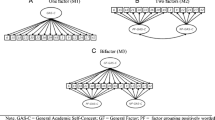Abstract
We aimed to (a) assess causal influences of three levels of self-concept on each other, (b) examine the relationship between each level of self-concept and academic achievement, and (c) compare the effect of self-concept on achievement with the effect of achievement on self-concept. In a two-year longitudinal study of 322 sixth and seventh grade students, influences over time between three levels of self-concept were weak. Zero-order correlations between self-concept and grades were positive and substantial, as in past studies. When using structural equation models, we found much weaker paths between self-concept and grades. Influences from self-concept to grades were very weak, but grades had a modest influence on subsequent discipline-specific self-concept. We conclude that past correlational studies have overstated the influence of self-concept on grades and of grades on self-concept.
Similar content being viewed by others
References
Bachman, J. G., and O'Malley, P. M. (1977). Self-esteem in young men: A longitudinal analysis of the impact of educational and occupational attainment.J. Personal. Social Psychol. 35: 365–380.
Bachman, J. G., and O'Malley, P. M. (1986). Self-concepts, self-esteem, and educational experiences: The frogpond revisited (again).J. Personal. Social Psychol. 50: 35–46.
Brookover, W. B., Paterson, A., and Thomas, S. (1962).Self-Concept of Ability and School Achievement. Report of Cooperative Research Project No. 845, U.S. Office of Education. Michigan State University, East Lansing.
Brookover, W. B., Paterson, A., and Thomas, S. (1964). Self-concept of ability and school achievement.Social. Educat. 37: 271–278.
Byrne, B. M. (1984). The general/academic self-concept nomological network: A review of construct validation research.Rev. Educat. Res. 54: 427–456.
Byrne, B. M. (1986). Self-concept/acadernic achievement relations: An investigation of dimensionality, stability, and causality.Can. J. Behav. Sci. 18: 173–186.
Byrne, B. M., and Shavelson, R. J. (1986). On the structure of adolescent self-concept.J. Educat. Psychol. 78: 474–481.
Calsyn, R. J., and Kenny, D. A. (1977). Self-concept of ability and perceived evaluation of others: Cause or effect of academic achievement?J. Educat. Psychol. 69: 136–145.
Fleming, J. S., and Courtney, B. E. (1984). The dimensionality of self-esteem: II. Hierarchical facet model for revised measurement scales.J. Personal. Social Psychol. 46: 404–421.
Hansford, B. C., and Hattie, J. A. (1982). The relationship between self and achievement/performance measures.Rev. Educat. Res. 52: 123–142.
Harter, S. (1983). Developmental perspectives on the self-system. In Hetherington, E. M. (ed.), & Mussen, P. H. (series ed.),Handbook of Child Psychology: Vol. IV. Socialization, Personality, and Social Development (4th ed.). Wiley, New York.
Harter, S. (1990). Causes, correlates, and the functional role of global self-worth: A life-span perspective. In Sternberg, R. J., and Kolligian, J., Jr. (eds.),Competence Considered. Yale University Press, New Haven, CT.
Hoge, D. R., Smit, E. K., and Hanson, S. L. (1990). School experiences predicting changes in self-esteem of sixth and seventh grade students.J. Educat. Psychol. 82: 117–127.
Joreskog, K. G., and Sorbom, D. (1986).LISREL VI. University of Uppsala, Sweden.
Marsh, H. W. (1987). The big-fish-little-pond effect on academic self-concept.J. Educat. Psychol. 79: 280–295.
Marsh, H. W., Byrne, B. M., and Shavelson, R. J. (1988). A multifaceted academic self-concept: Its hierarchical structure and its relation to academic achievement.J. Educat. Psychol. 80: 366–380.
Maruyama, G., Rubin, R. A., and Kingsberry, G. G. (1981). Self-esteem and educational achievement: Independent constructs with a common cause?J. Personal. Social Psychol. 40: 962–975.
Newman, R. S. (1984). Children's achievement and self-evaluations in mathematics: A longitudinal study.J. Educat. Psychol. 76: 857–873.
Pottebaum, S. M., Keith, T. Z., & Ehly, S. W. (1986). Is there a causal relation between self-concept and academic achievement?J. Educat. Res., 79: 140–144.
Rosenberg, M. (1965).Society and the Adolescent Self-Image. Princeton University Press, Princeton.
Rosenberg, M., Schooler, C., and Schoenbach, C. (1989). Self-esteem and adolescent problems: Modeling reciprocal effects.Am. Social. Rev. 54: 1004–1018.
Scheirer, M. A., and Kraut, R. E. (1979). Increasing educational achievement via self-concept change.Rev. Educat. Res., 49: 131–150.
Shavelson, R. J., and Bolus, R. (1982). Self-concept: The interplay of theory and methods.J. Educat. Psychol 74: 3–17.
Shavelson, R. J., Hubner, J. J., and Stanton, G. C. (1976). Self-concept: Validation of construct interpretations.Rev. Educat. Res. 46: 407–441.
Skaalvik, E. M., and Hagtvet, K. A. (1990). Academic achievement and self-concept: An analysis of causal predominance in a developmental perspective.J. Personal. Social Psychol. 58: 292–307.
Van Boxtel, H. W., and Monks, F. J. (1992). General, social, and academic self-concepts of gifted adolescents.J. Youth Adolesc. 21: 169–186.
Wylie, R. (1979).The Self-Concept. Volume 2: Theory and Research on Selected Topics. University of Nebraska Press, Lincoln.
Author information
Authors and Affiliations
Additional information
Financial support was supplied by the Life Cycle Institute, Catholic University.
Received Ph.D. from Harvard University. Research interests include self-concept, religious development, and moral development.
Received Ed.D. from Michigan State University. Research interests include self-concept and reading instruction.
Received B.A. from The Catholic University of America. Research interests include political socialization and social movements.
Rights and permissions
About this article
Cite this article
Hoge, D.R., Smit, E.K. & Crist, J.T. Reciprocal effects of self-concept and academic achievement in sixth and seventh grade. J Youth Adolescence 24, 295–314 (1995). https://doi.org/10.1007/BF01537598
Received:
Accepted:
Issue Date:
DOI: https://doi.org/10.1007/BF01537598




